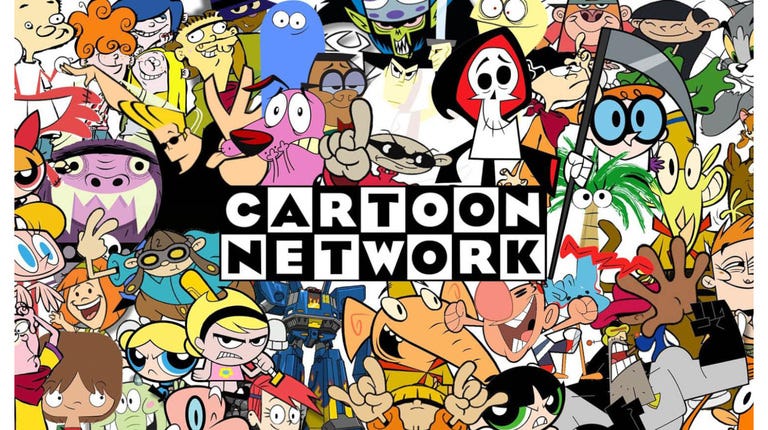So, what's the future of imagination, without plot-based media?
The dwindling fate of Cartoon Network and a declaration from a Gen Alpha kid that's against ''plot-based media'' made me think about imagination: next
So, as I covered in last week's RADIO KNIFE, the slow death of Cartoon Network has been on my mind. It was announced a few weeks ago that under the misdirection of the Akira monster-sized merged media conglomerate, WBD Discovery, and its stupid strategy to strip Cartoon Network of its brand and shoddily scatter its assets over HBO Max is failing badly. Only 13% of 10-to-12-year-olds have watched any CN programming on Max, compared to 32% on Hulu, 57% on Disney+, and 72% on Netflix. Not great viewing at all.
But while I was grieving Cartoon Network, I started thinking about the future of imagination. A quote I found here perfectly captures why streamers and traditional media will struggle to connect with the youth and where my questions about the future of imagination come from.
"I saw this TikTok from a woman explaining that to bond with her Gen Alpha sister, she asked her what her favourite Disney Channel shows were. Her sister looked her dead in the eyes and said, 'I don't engage with plot-based media.'" — Devin Williams
Since the oldest a Gen Alpha kid could be now is 14, this media literacy and discernment—identifying what type of media they like and don't like—is impressive. But it's also a generational declaration of war. Her derisive view of plot-based media is likely because she sees it as the stuff of old, the type of media her big sister likes, and big sis is the big uncool in her eyes. Bonding ain't easy. But that sharp answer reveals something interesting about how this generation's imagination works.
What’s We Lose (maybe that’s the point?)
You lose a heck of a lot of storytelling opportunities without plot-based media. The beauty of being a kid who follows episodic content is the worlds you build on top of these beloved universes. You know what you're getting, most of the time (looking at you, Goku on Namek). Those narrative structures enabled you to build endlessly on top of them.
Like when you flipped your toy box upside down on a Saturday morning to find a Beetleborg fighting a Transformer who's collaborating with Woody on how to defeat Emperor Zurg, who's teamed up with Spiderman and Jubilee. Far-fetched cross-franchise playground fables like "Zordon from Power Rangers is gonna be a character in Tekken 4" wouldn't have caught fire and wouldn't have unveiled the imagination of that shy classmate who, off the back of this hilarious, physically impossible and brilliantly ridiculous lie, became a member of the friendship group.
Hypercharge: Unboxed gets it.
The power of plot-based media was the framework it provided. Coupled with imagination, the possibilities for the worlds built upon it were endless. It reminds me of all the crazy PlayStation concepts that used to fly around the internet and the IT lab at school. The certainty of these TV shows, products and their narrative worlds enabled a creative expression that was both contextual and beautifully tangential.

Cartoon Network helped shape and mould the sharper, more irreverent edges of my mind. The spirit of adventure in every single show made it about more than just being transported into a different place—it was about approaching the world with an energy of impossibility. An indefatigable appetite for mischief in any situation you find yourself in. That's the true legacy of the golden age of Cartoon Network: reminding kids that life is a playground, and your job is to test it, prod it and play in it.
Imagination, Evolved
But perhaps, for Gen Alpha, "plot-based media" is just a codename for franchises. This is the first digital native generation, who were uploaded at conception and downloaded during delivery. Their dislike of plot-based media might just be a dislike of being sold the same thing over and over again. After all, Alpha are an innately media-literate cohort. As the eldest ones are now 14, they've probably watched their parents, aunties, and uncles get excited about nostalgic rehashes and thought… Nah, don't fancy that.
The stagnation of mass storytelling in the most dominant forms of plot-based media—film, TV, gaming and even novels—might have trickled down to Gen Alpha to put them off this style of storytelling altogether. Now, I'm basing this on that one quote, which is just one person. But thinking about Bloomberg Businessweek's latest editorial, covering YouTube creators who are investing heavily in the platform to take on Hollywood studios, it adds up. Alpha's favourite creators will follow, developing high-budget content, TV-level content in their language, to their tastes. It tracks.
It explains why they're producing their own newspapers. The Ditch Weekly, though thematically, is the stuff of Wes Anderson canon—a bunch of whip-smart, Ivy League-progeny writing about the misadventures of Cape Cod and Montauk. And though it is exactly the sort of pastime you expect rich kids to have, seeing this is heartening. A sign that print is far from dead, and for the youngest generation, they view it as something loftier than the millions of things you could do on your phone.
But more interestingly is the signal: this generation's idea of imagination might not be far-flung worlds and alien warriors whose hair colour represents different stages of flame. Maybe imagination for this generation won't be about going into disparate, crazy worlds like it was for us. This world is crazy enough, perhaps they'll be more interested in the challenge of unearthing weird and unique angles within the everyday experience and bringing them to light, creatively. Which could mean that alpha will be a generation of great journalists? Who knows.
After all, imagination is simply the expression of one's worldview. Here's a generation that was born into the 1080x1920 aspect ratio—it's unsurprising that they'd want to tell creative, autobiographical stories over what we may view as traditionally imaginative storytelling. It's main character energy on crack: forget highfalutin, plot-based fiction—we're the story, we've got the stories.
What This Means For Everyone Else
My studio, House Captain, recently published a quarterly insights report—The Quartertape (it's fantastic, I'm biased, download here 🔗). One of our chapters covers the emergence of brands as broadcasters, filling the programming gap for this new generation of Gen Zalpha youth.
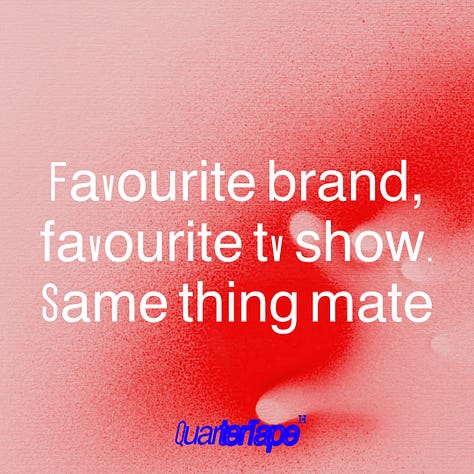
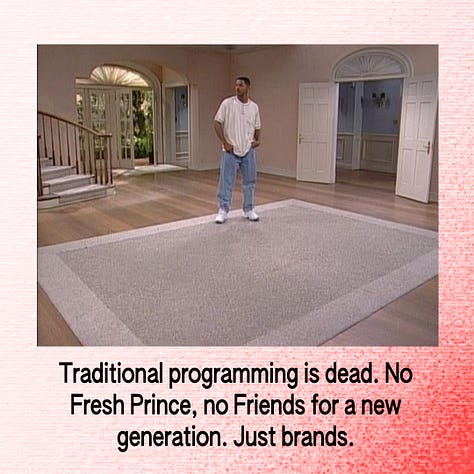
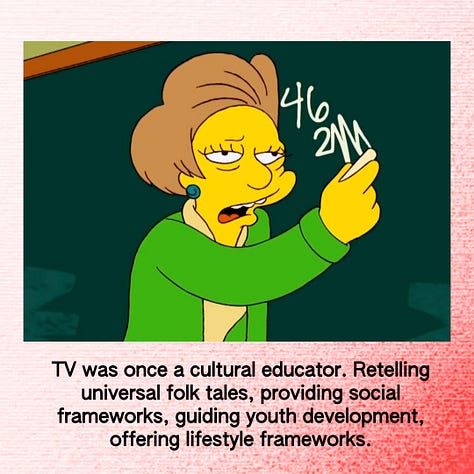
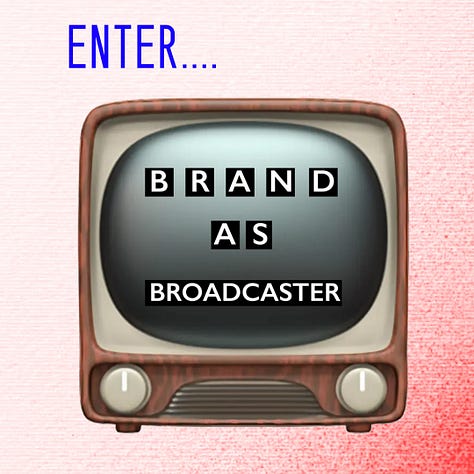
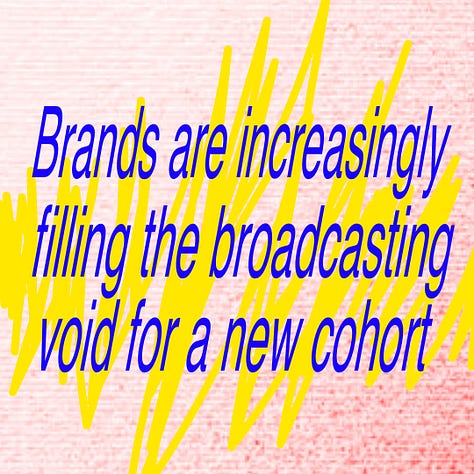
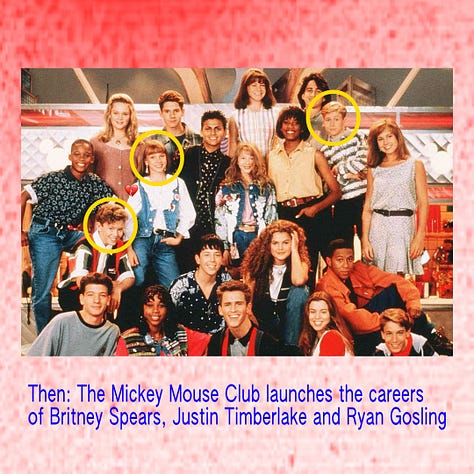
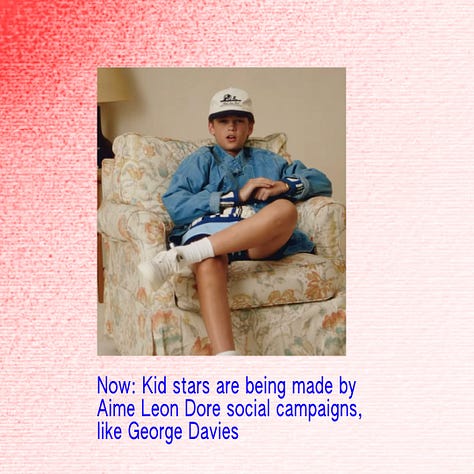
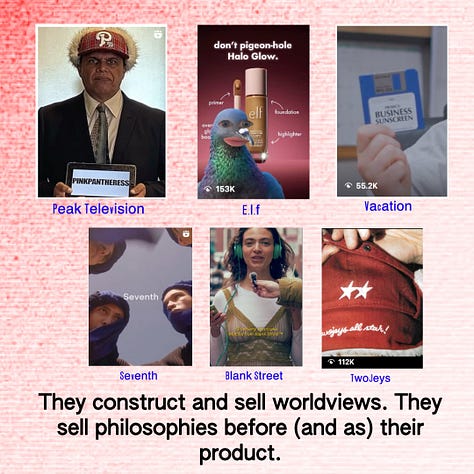
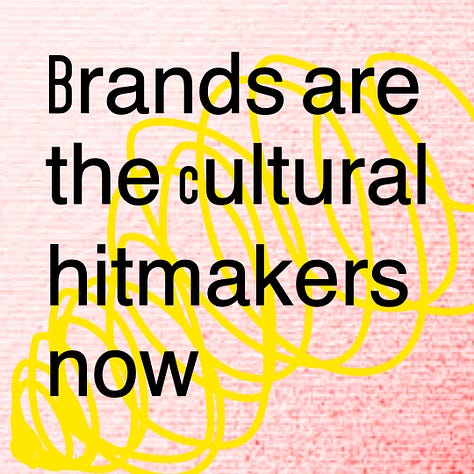
Here's where it gets fascinating: perhaps product and brand have been so synonymous with their existence through devices, that they're able to recognise it as an inevitability of existence. Which is why brands can function as broadcasters for this gen, much like the BBC was accepted as just a fixture of our media landscape. Brands are media institutions as much as they are businesses. So Gen Alpha can recognise this, and because of that, separate their creative expressions from them?.
Millennials will mourn Cartoon Network because, annoyingly, despite any restraint, we're damn sensitive to nostalgia. There's a romance to the stories of your formative years, never dying—it's the party that doesn't end, even when you know better than to keep going. I cannot imagine my childhood without the products, brands and franchises that inspired the joy that it was.
But to a generation who've entered a world digital first, perhaps the idea of products or franchises providing a foundation for their creative expression, like they did for us, is actually the opposite of what they’ll view as imaginative.
Maybe that Gen Alpha kid quoted earlier, who doesn't engage with plot-based media, is onto something… She's not rejecting imagination—she's just refusing to rent it from Disney - renegotiating the terms of what constitutes valuable storytelling and use of time.
Imagination is always best as a blank slate, anyway.
📡 That was a RADIO KNIFE transmission. Thanks for listening.📡
Written by Damola Oladapo, founder of House Captain and freelance strategist and copywriter. His strategic work spans global brands including Nike, Diageo, Brooks Running, and EA SPORTS FIFA.
RADIO KNIFE connects the dots between culture and commerce, delivering sharp insights that reveal how global trends, consumer shifts, and cultural moments shape the brands and behaviours around us.
Subscribe for weekly (hopefully) analysis that cuts through surface-level takes to uncover why things work the way they do.
ALWAYS ARRIVE UNPREPARED.
Like the connections being made? That’s RADIO KNIFE cuts through the noise to reveal the frequency that explains why culture <> commerce work the way they do. Hit subscribe to keep those dots joined up.






